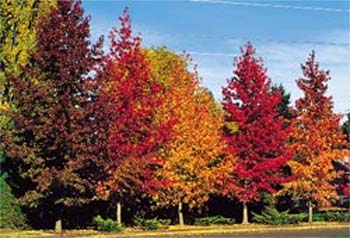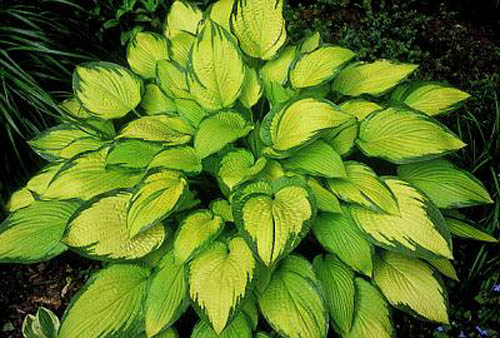Solomon Seals are graceful shade plants that provide nice form and structure to the garden. These plants have long arching unbranched stems, they have nice clean, veined leaves with clusters of bell like greenish yellow to whitish yellow flowers hanging down from the stems at the leaf axis. In late summer and fall showy berries are produced that are blue to dark blue in color.
The rhizomes of Solomon seals are white, long, thick and somewhat knobby, they usually grow about 2-4 inches underground in a horizontal angle to the surface. Most Solomon seals grow in spreading colonies that are easy to dig up and divide.
There are over 60 varieties of Solomon Seals growing native in North America, Europe, Asia, Japan and Siberia. Solomon seals are grown as specimen plants or along walks as they have graceful arching stems. The variegated forms are showy and many Solomon seals make great plants for cutting and even drying. Some excellent Solomon Seals to try are:
Polygonatum biflorum – The only native American species of Polygonatum makes a handsome stand of erectly nodding, leafy stalks to three feet. in moist shade or partial shade, with very white bells in clusters of two or sometimes three followed by blue berries.
Polygonatum cirrhifolium – A more easterly form of this species with taller stems, to eight feet and whorls of narrow foliage with curled leaf tips and axillary clusters of very white flowers resulting in beautiful translucent red fruit. Semi-shaded sites and moist, humus-rich but well-drained soil.
Polygonatum falcatum – An extremely fine plant that has unfortunately had its image tarnished by P. odoratum that travels about commerce using its name. The true P. falcatum is a rare plant in cultivation and produces elegant and robust stems to six feet in height.
Polygonatum geminiflorum – A very pretty and distinctive species rare in cultivation, with short and broad ovate leaves borne in whorls of three along fifteen inch stems, with axillary clusters of white flowers produced in mid-spring.
Polygonatum hookeri – This is the smallest of all Solomon’s Seals, rising only to three inches in height, but spreading outward to make substantial colonies over time. In early spring, upturned, star-shaped, pink-lavender flowers are formed, resulting in red fruit.
Polygonatum humile – This rare and diminutive species produces a thick carpet of four inch stems cloaked in dark green leaves and pairs of axillary white blossoms in spring. A lovely ground cover for the moist, shaded garden.
Polygonatum multiflorum – Round leaves along arching two foot stems with axillary clusters of two – five white, green-tipped flowers followed by bluish black fruit. Lovely in the woodland in fertile, moist soil.
Polygonatum odoratum – Polygonatum odoratum is a wide spread species. These represent plants of Asian origin, with decidedly angled stems to three feet, carrying pairs of decidedly upwardly held leaves and axillary pairs of fragrant white, green rimmed, bells produced in late spring, for partial shade in any well-drained soil.



